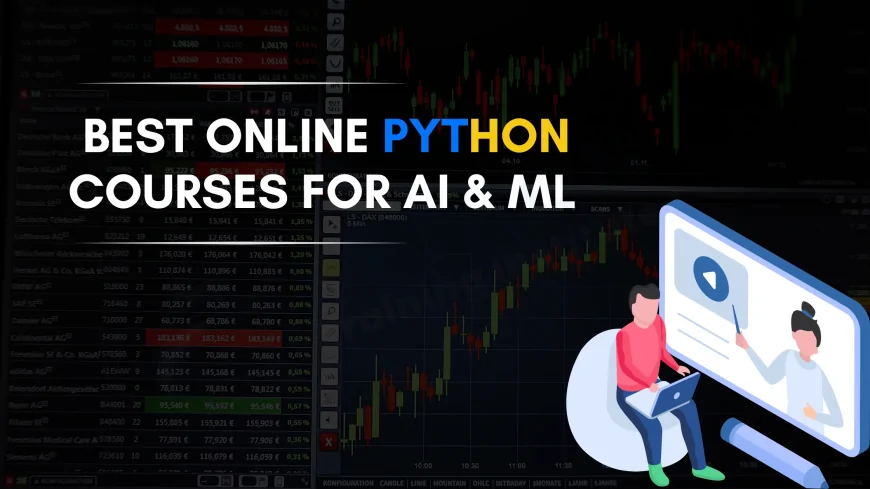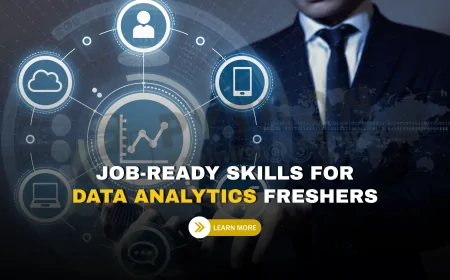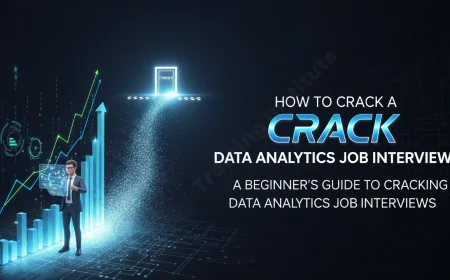Best Online Python Courses for AI and ML | Learn Fast, Build Smarter
Discover the best online Python courses for AI and ML. Learn essential libraries, work on real-world projects, and build a career in artificial intelligence and machine learning with flexible and beginner-friendly Python training.

Artificial Intelligence (AI) and Machine Learning (ML) have gone from sci-fi buzzwords to must-have skills in today’s tech ecosystem. Whether you're building predictive models, chatbots, self-driving car logic, or personalizing user recommendations—Python is at the heart of it all. But how do you find the best online Python courses tailored specifically for AI and ML?
With thousands of options online, it's overwhelming to choose what works for your learning pace, goals, and background. This guide dives deep into how to choose the best Python courses for AI/ML, key topics they should cover, different formats, what makes a course “great,” and how to align your learning path with future career demands.
Why Python Is the Language of AI and ML
Python is not just a beginner-friendly language—it’s also deeply entrenched in the AI/ML ecosystem. Here’s why:
-
Readable syntax helps focus on solving AI/ML problems, not debugging brackets.
-
Rich libraries like NumPy, TensorFlow, PyTorch, Scikit-learn, and Keras accelerate development.
-
Community support ensures that help and documentation are always available.
-
Versatility enables use in web development, automation, data science, and AI/ML projects.
What Makes a Python Course Ideal for AI and ML?
When choosing an online course, don’t just settle for "learn Python in 2 hours." Instead, make sure it includes:
-
Foundations of Python: Syntax, data types, control flow, functions, and OOP.
-
AI/ML libraries: Deep coverage of Scikit-learn, Pandas, NumPy, Matplotlib, TensorFlow, and PyTorch.
-
Math essentials: Linear algebra, statistics, calculus basics, and probability.
-
Hands-on projects: Real-world applications like spam detectors, image classifiers, recommendation engines.
-
Model lifecycle: From data preprocessing to model deployment.
-
Jupyter Notebooks and interactive coding environments.
-
Version control & cloud basics for modern workflow.
Types of Python Courses for AI/ML
Let’s break down different formats and how each suits learners:
1. Beginner to Advanced Track (Full-Stack Learning Path)
-
Duration: 3–6 months
-
Starts from zero and covers Python, ML theory, and AI model deployment.
-
Includes deep dives into neural networks and computer vision.
-
Ideal for career switchers or freshers.
2. Specialization-Based Courses
-
Duration: 4–12 weeks per specialization
-
Focused on topics like NLP, Deep Learning, or Computer Vision.
-
Requires some prior knowledge of Python or ML.
-
Great for upskilling professionals or freelancers.
3. Project-Centric Bootcamps
-
Duration: Variable (4–16 weeks)
-
Project-first approach: learn by building.
-
Suits learners who are hands-on and want portfolio material.
4. Self-Paced Video Courses
-
Duration: Flexible
-
Allows binge-learning or slow progression.
-
Best for disciplined learners or those with unpredictable schedules.
Best Course Structures: What to Look For
Module Breakdown Example
| Module | Topics Covered |
|---|---|
| Week 1–2 | Python Basics: Variables, Loops, Functions |
| Week 3 | OOP, Exception Handling |
| Week 4 | NumPy, Pandas |
| Week 5 | Data Visualization (Matplotlib, Seaborn) |
| Week 6 | Intro to Machine Learning |
| Week 7–8 | Supervised & Unsupervised Learning |
| Week 9 | Neural Networks & Deep Learning |
| Week 10 | TensorFlow/PyTorch |
| Week 11 | NLP or CV Project |
| Week 12 | Model Deployment with Flask or Streamlit |
Core Topics Every Good Python for AI/ML Course Should Cover
1. Python Fundamentals
-
Syntax and semantics
-
Data structures
-
Functional programming
-
Object-oriented programming
2. Data Handling with Pandas and NumPy
-
DataFrames and Series operations
-
Matrix manipulation
-
Cleaning and transforming data
3. Data Visualization
-
Plotting graphs with Matplotlib and Seaborn
-
Exploratory Data Analysis (EDA)
-
Dashboard creation using Plotly or Dash
4. Machine Learning
-
Regression, classification, clustering
-
Model training, tuning, and evaluation
-
Cross-validation and pipeline building
5. Deep Learning
-
Understanding neural networks
-
Convolutional Neural Networks (CNNs)
-
Recurrent Neural Networks (RNNs)
-
Frameworks: TensorFlow and PyTorch
6. Special Topics
-
Natural Language Processing (NLP): sentiment analysis, text generation
-
Computer Vision: object detection, face recognition
-
Reinforcement Learning
-
AutoML and model optimization
7. Model Deployment
-
Flask/Streamlit web apps
-
Model serving via APIs
-
Deployment on cloud platforms
Unique Add-Ons That Make a Python AI/ML Course Stand Out
-
Git and GitHub for version control
-
Agile development and sprint-based learning
-
Access to a student community for peer feedback
-
Capstone projects linked to real-world datasets
-
Interview prep modules for data science and ML roles
-
Quizzes and coding challenges for retention
-
Certificate of completion or portfolio showcase feature
Course Duration vs. Learning Depth
| Course Length | What You Can Expect |
|---|---|
| 2–4 weeks | Python basics + intro to ML |
| 6–8 weeks | Intermediate ML models, small projects |
| 3 months | End-to-end AI/ML pipelines, specializations |
| 6+ months | Deep learning mastery, portfolio, deployment skills |
Best Learning Paths Based on Background
For Beginners in Programming
-
Start with Python basics.
-
Move to NumPy and Pandas.
-
Then explore Scikit-learn and shallow ML models.
For Data Analysts Transitioning to AI
-
Brush up Python syntax.
-
Focus heavily on ML models and visualization.
-
Add deep learning later.
For Developers Learning ML
-
Skip Python basics if already fluent.
-
Focus on AI/ML libraries and deployment.
Sample Projects You Should Build in a Good Course
-
Spam classifier using Naive Bayes
-
Face recognition with OpenCV and CNN
-
Sentiment analyzer with NLP
-
Predictive model for stock prices
-
Recommender system for movies or products
-
Chatbot using NLP models
-
Image classification with TensorFlow
When a Course Is NOT Worth It
-
No projects or assessments
-
Outdated libraries (e.g., TensorFlow 1.x in 2025)
-
No specialization modules or deployment focus
-
Too theoretical or lacking in hands-on practice
-
Instructors with no industry experience
Pros and Cons of Free vs. Paid Courses
| Category | Free Courses | Paid Courses |
|---|---|---|
| Cost | Free | Varies ($20 to $1000) |
| Depth | Often basic | More comprehensive |
| Support | Community forums | Direct mentorship |
| Certification | Often none | Usually included |
| Projects | Limited | Portfolio-worthy |
| Updates | Infrequent | Regular & maintained |
Tip: Many free courses are a great starting point, but serious learners benefit more from structured paid options with projects and support.
AI/ML Career Roles You Can Prepare For With These Courses
-
Machine Learning Engineer
-
AI Developer
-
Data Scientist
-
Python Developer
-
NLP Engineer
-
Computer Vision Specialist
-
AI Research Assistant
-
Automation Engineer
What Skills Recruiters Look for After Course Completion
-
Strong understanding of ML algorithms
-
Ability to explain model decisions (model interpretability)
-
Clean and modular code in Python
-
Use of Jupyter Notebooks or Google Colab
-
Experience with Git
-
Hands-on experience with TensorFlow or PyTorch
-
End-to-end project deployment
How to Choose the Best Course for YOU
Ask yourself:
-
Am I learning Python from scratch or upskilling?
-
Do I need real-world projects for my resume?
-
Is certification important to me?
-
Do I prefer guided instruction or self-paced study?
-
What specific AI/ML domains interest me most?
Top Features to Prioritize in an Online Python Course for AI/ML
Lifetime access
Instructor Q&A or chat support
Hands-on labs and practice sets
Capstone project submission
Regularly updated content
Integration with Jupyter or Colab
Focus on tools like Scikit-learn, TensorFlow, Keras
Step-by-step guided assignments
Final certification or badge
Interview prep resources
FAQ's
What are the best online Python courses for AI and ML in Pune?
The best online Python courses for AI and ML in Pune are those that offer hands-on projects, cover libraries like TensorFlow and Scikit-learn, and include concepts like deep learning, NLP, and model deployment. Look for courses that support flexible learning, certification, and career support.
How can Python training in Pune help with AI and ML careers?
Python training in Pune equips learners with foundational to advanced skills in AI and ML. Courses typically include real-world projects, expert guidance, and exposure to tools used in the industry—preparing candidates for roles such as ML Engineer, AI Developer, or Data Scientist.
Do Python AI/ML courses include deep learning?
Yes, most advanced Python AI/ML courses include deep learning modules that cover neural networks, CNNs, RNNs, and frameworks like TensorFlow and PyTorch. These are essential for tasks like image recognition and natural language processing.
What are the prerequisites for joining an AI/ML Python course?
Basic knowledge of mathematics, statistics, and programming logic is helpful. However, many Python AI/ML courses in Pune start from scratch, making them suitable for beginners and professionals alike.
How long does it take to complete a Python AI/ML course online?
The duration varies based on course depth. A basic course may take 4–6 weeks, while a comprehensive AI/ML course can range from 3 to 6 months, depending on your pace and project complexity.
Can I get a job after completing a Python AI and ML course?
Yes, many learners secure jobs after completing Python AI/ML training. Strong portfolios, real-world projects, and interview preparation included in many courses help candidates land roles in top tech firms or startups.
Is Python enough to learn AI and machine learning?
Python is the primary language for AI/ML due to its simple syntax and vast library ecosystem. However, understanding the underlying math, algorithms, and problem-solving approach is also important for career success.
Are online AI/ML Python courses in Pune recognized by employers?
Yes, many employers recognize the value of online AI/ML Python courses, especially if they include practical projects and assessments. Certifications from well-structured programs can enhance your credibility in job interviews.
What libraries are taught in Python AI and ML courses?
Common libraries include NumPy, Pandas, Scikit-learn, Matplotlib, Seaborn, TensorFlow, Keras, and PyTorch. These tools form the backbone of data analysis, model training, and deep learning.
Can I learn AI and ML with Python as a complete beginner?
Yes, beginner-friendly courses in Pune often start with the basics of Python before gradually introducing machine learning and AI topics. These step-by-step approaches are ideal for learners without prior experience.
Do AI/ML Python courses in Pune offer certification?
Most Python AI/ML courses offer certificates upon completion, which can be added to your resume or LinkedIn profile. Some courses may also include assessments or project reviews before issuing certification.
Are there any short-term Python courses for AI and ML in Pune?
Yes, short-term Python courses are available online and typically last from 4 to 8 weeks. These focus on fast-tracking skills for specific AI/ML areas like NLP, computer vision, or supervised learning models.
What is covered in a typical Python AI/ML course curriculum?
Typical topics include Python basics, data handling, machine learning algorithms, deep learning, NLP, model evaluation, deployment, and real-world projects. Advanced courses may also include reinforcement learning and AI ethics.
How do online Python courses compare with classroom training in Pune?
Online Python courses offer flexibility and can be just as effective as classroom training if they include mentor support, interactive sessions, and project work. They’re ideal for working professionals and students with tight schedules.
Is placement support included in Python AI/ML courses in Pune?
Some online courses offer placement assistance, resume building, and interview prep as part of the training package. Look for courses that emphasize career readiness and have good success stories.
What are the career roles after completing a Python AI and ML course?
Popular roles include Machine Learning Engineer, Data Scientist, Python Developer, AI Analyst, NLP Engineer, and Automation Engineer. These roles are in high demand across various sectors.
Can I pursue AI/ML Python training while working full-time?
Yes, many online Python AI/ML courses are designed for part-time learners. They offer self-paced content, weekend classes, and recorded sessions to accommodate working professionals.
How important are projects in Python AI and ML training?
Projects are crucial. They allow you to apply learned concepts, build a portfolio, and demonstrate practical skills to employers. Good courses include multiple industry-based projects for hands-on learning.
What hardware or software do I need for an AI/ML Python course?
A laptop with at least 8GB RAM is recommended for AI/ML development. You'll need Python, Jupyter Notebooks, and libraries like TensorFlow or Scikit-learn, most of which are free and open source.
Are there AI and ML courses for intermediate Python users?
Yes, intermediate learners can choose courses that skip Python basics and dive directly into model building, deep learning, and deployment. These courses are ideal for those with some coding experience.
Can I build a portfolio during a Python AI/ML course?
Definitely. Many courses encourage learners to complete mini-projects and capstone projects, which can be showcased on GitHub or LinkedIn to attract potential employers.
What is the average salary after Python AI/ML training in Pune?
Salaries vary based on role and experience. Freshers can expect ₹4–6 LPA, while professionals with project experience and certifications may earn ₹8–15 LPA or more, depending on the job role and company.
Do online Python courses cover AI ethics and real-world challenges?
Advanced courses often include modules on AI ethics, model bias, and real-world challenges like data privacy or fairness—important knowledge for professionals in this space.
Can I shift to AI/ML from a non-technical background with Python courses?
Yes, Python’s simplicity and beginner-friendly courses make it possible for non-tech learners to transition into AI/ML. Courses that include foundational programming, math concepts, and practical demos are ideal for such learners.
Will I get a certificate after completing an online Python AI/ML course?
Yes, most online platforms provide a certificate after you complete the lessons, assignments, and projects. These certificates validate your skills and can be shared with employers or on job portals.
Let Python Unlock the AI/ML World for You
The best online Python courses for AI and ML are not just about syntax or watching lectures—they’re about building intelligent systems, solving real problems, and unlocking a future in one of the fastest-growing tech sectors. Whether you’re a beginner, a working professional, or an academic explorer, the right course can be your launchpad into artificial intelligence.
Make your learning journey count. Choose a course that fits your goals, teaches the full pipeline—from data to deployment—and helps you build a portfolio that speaks louder than your resume.
What's Your Reaction?
 Like
0
Like
0
 Dislike
0
Dislike
0
 Love
0
Love
0
 Funny
0
Funny
0
 Angry
0
Angry
0
 Sad
0
Sad
0
 Wow
0
Wow
0














